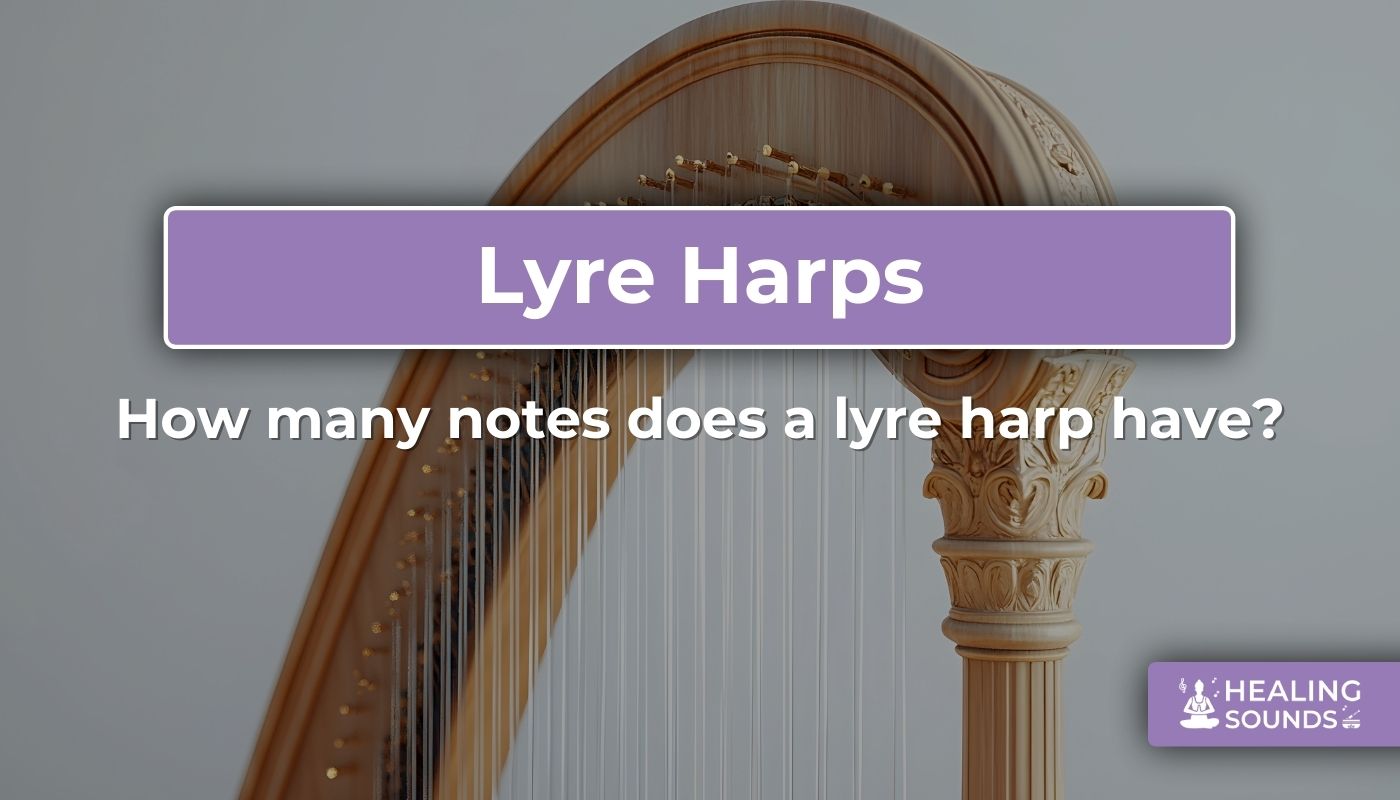Le son envoûtant de la harpe-lyre évoque des images de mythes anciens et de mélodies paisibles. En tant que mélomane intrigué par cet instrument à cordes intemporel, vous vous demandez peut-être combien de notes une harpe-lyre peut produire exactement. Que vous soyez débutant explorant ses sonorités apaisantes ou musicien expérimenté en quête d'une plus grande polyvalence, comprendre la tessiture musicale d'une lyre est essentiel. Ce guide explore la relation entre cordes et notes, explore différents modèles de harpe-lyre et vous aide à trouver l'instrument qui correspond à votre parcours musical.
Qu'est-ce qu'une harpe-lyre ?
La harpe-lyre est un instrument à cordes fascinant, dont les origines remontent à des milliers d'années, et qui est associé à la culture grecque antique et à des figures comme Apollon. Sa conception caractéristique se caractérise par des cordes tendues sur une caisse de résonance, qui s'étendent jusqu'à une traverse maintenue par deux bras distincts. Contrairement à une harpe de concert moderne, les cordes sont souvent parallèles à la table d'harmonie plutôt que perpendiculaires.
Lorsqu'on pince une corde, elle vibre, et ces vibrations sont amplifiées par le corps de l'instrument, produisant un son distinct et doux. La hauteur de la note produite dépend de la longueur, de la tension et de l'épaisseur de la corde. Mais combien de notes distinctes un instrument peut-il produire ?
Combien de cordes déterminent les notes sur une harpe lyre ?
La réponse fondamentale à la question « Combien de notes une harpe-lyre possède-t-elle ? » réside dans le nombre de cordes. Chaque corde d'une harpe-lyre est généralement accordée sur une note spécifique et unique. Ainsi, une harpe-lyre à 7 cordes peut jouer 7 notes distinctes, une harpe à 16 cordes peut en jouer 16, et ainsi de suite. Le nombre total de cordes définit la tessiture de base de l'instrument.
Les lyres traditionnelles avaient souvent moins de cordes, de 4 à 7, adaptées à l'accompagnement vocal ou aux mélodies simples. Au fil du temps, et notamment avec les variations modernes, le nombre de cordes a considérablement augmenté, élargissant les possibilités musicales. Aujourd'hui, on trouve des harpes-lyres allant de 7 à 24 cordes, voire plus.
Le choix d'une lyre commence souvent par la prise en compte de la tessiture souhaitée. Un modèle comme la lyre à 16 cordes offre un bon équilibre pour les débutants et les musiciens intermédiaires, offrant davantage de possibilités mélodiques que les lyres traditionnelles plus petites.

Harpe-lyre à 16 cordes en acajou
139,90 $ 199,90 $
Découvrez des sons riches et chaleureux, parfaits pour apprendre des mélodies et explorer les notes de la harpe lyre sur une gamme confortable.
Découvrez la lyre à 16 cordesFacteurs influençant la gamme de notes
Bien que le nombre de cordes soit le principal facteur déterminant le *nombre* de notes fondamentales, d'autres éléments influencent la *portée* et l'accessibilité des différentes hauteurs :
- Nombre de cordes : Plus il y a de cordes, plus la gamme de notes disponibles est large sans réaccordage.
- Accordage : Les harpes-lyres sont généralement accordées diatoniquement (comme les touches blanches d'un piano) dans une tonalité spécifique (par exemple, do majeur). Réaccorder les cordes permet de jouer dans différentes tonalités ou modes, modifiant ainsi les notes disponibles.
- Leviers (sur certains modèles) : Les harpes lyres plus sophistiquées, parfois appelées lyres celtiques ou lyres à levier, intègrent des leviers au sommet de certaines cordes. Actionner un levier augmente la hauteur de la corde correspondante d'un demi-ton, permettant ainsi aux musiciens d'accéder aux notes chromatiques (comme les touches noires d'un piano) et de changer de tonalité plus facilement sans réaccorder l'instrument.
Exploration du nombre de cordes de la harpe-lyre commune et de leurs notes
Le nombre de cordes influence considérablement les performances de l'instrument. Examinons quelques configurations courantes :
Lyres à 7-10 cordes
Ces modèles se rapprochent le plus des lyres historiques. Une lyre à 7 cordes couvre généralement une octave dans une gamme diatonique (par exemple, do-fa-sol-sa-b). Une lyre à 10 cordes élargit légèrement cette gamme, en ajoutant parfois des notes en dessous de la fondamentale ou au-dessus de l'octave. Elles sont idéales pour les mélodies folkloriques simples, les reconstitutions historiques ou la musique de méditation profonde.
Lyres à 16-19 cordes
Cette tessiture est très appréciée des débutants comme des musiciens intermédiaires. Une harpe lyre à 16 ou 19 cordes couvre généralement deux à deux octaves et demie, offrant des possibilités mélodiques et harmoniques nettement plus étendues. Les instruments de cette tessiture, comme la harpe lyre irlandaise à 19 cordes, sont parfois équipés de leviers, élargissant encore le spectre des notes disponibles.
20+ lyres à cordes
Les harpes-lyres à 20 cordes ou plus (comme les modèles à 23 ou 24 cordes) offrent une polyvalence exceptionnelle. Elles couvrent une tessiture plus large, s'étendant souvent sur trois octaves ou plus. Associées à des leviers, ces instruments peuvent jouer des morceaux plus complexes dans différentes tonalités, alliant le timbre unique de la lyre à un potentiel harmonique étendu.
À retenir :
- Le nombre de cordes est directement égal au nombre de notes fondamentales qu'une harpe lyre peut jouer à tout moment.
- Les gammes courantes incluent 7 à 10 cordes (de base), 16 à 19 cordes (polyvalent) et 20 cordes et plus (gamme étendue).
- Les leviers peuvent ajouter des demi-tons, augmentant ainsi le nombre total de hauteurs disponibles au-delà du nombre de cordes.
Découvrez les harpes lyres avec des gammes de notes étendues

399,90 $
499,90 $
Doté de leviers pour accéder facilement aux notes dièses, élargissant ainsi la gamme diatonique pour la harpe lyre . Idéal pour la musique celtique. En savoir plus ➔

479,90 $
623,90 $
Offre une vaste gamme de notes de harpe lyre avec des leviers pour une polyvalence chromatique, idéale pour un jeu expressif et des performances exceptionnelles. En savoir plus ➔
Offre une large gamme de notes de harpe sur un corps en bois résonnant, offrant une clarté exceptionnelle adaptée à divers styles musicaux. En savoir plus ➔
Au-delà des notes : les qualités thérapeutiques de la harpe-lyre
Bien que la compréhension du nombre de notes d'une harpe-lyre soit importante pour les musiciens, l'attrait de cet instrument va au-delà de ses capacités techniques. La harpe-lyre est réputée pour sa sonorité apaisante et éthérée, ce qui en fait un choix populaire en thérapie sonore.
La douce résonance et l'accordage typiquement diatonique créent des harmonies consonantes qui favorisent la relaxation, réduisent le stress et encouragent la pleine conscience. Pincer les cordes, ressentir les vibrations et écouter les sons déclinants peut être une pratique profondément méditative, tant pour le musicien que pour l'auditeur. Nombreux sont ceux qui constatent que se concentrer sur la création de mélodies simples apaise l'esprit et favorise un sentiment de paix intérieure.
Choisir sa harpe-lyre : adapter les notes à vos besoins
Choisir la bonne harpe lyre implique d'adapter sa gamme de notes et ses caractéristiques à vos objectifs :
- Débutants et méditation : Une lyre de 7 à 16 cordes pourrait être idéale. Moins de cordes simplifient l'apprentissage et la tessiture est suffisante pour des mélodies simples et un jeu méditatif.
- Amateurs et musique folklorique : Une lyre de 16 à 19 cordes offre un bon équilibre entre tessiture et maniabilité, idéale pour jouer une grande variété de morceaux. Les modèles à leviers offrent une plus grande flexibilité.
- Performance et musique complexe : les lyres à plus de 20 cordes, en particulier celles avec leviers, offrent la gamme étendue nécessaire pour des arrangements et des performances plus complexes.
Tenez compte des types de musique que vous souhaitez jouer, de votre niveau actuel et de l'importance que vous accordez à la portabilité ou à la profondeur sonore. Cela vous aidera à choisir un instrument à cordes qui vous inspire.
Conclusion
La question « Combien de notes pour une harpe-lyre ? » permet de comprendre la diversité de cet instrument à cordes, ancien et moderne. Le nombre de notes correspond directement au nombre de cordes, allant des modèles traditionnels à 7 cordes aux modèles contemporains polyvalents à 24 cordes, voire plus. Des facteurs comme l'accordage et la présence de leviers élargissent encore les possibilités musicales.
Que vous soyez attiré par la harpe-lyre pour son importance historique, son potentiel musical ou ses profondes vertus thérapeutiques, il existe un instrument parfaitement adapté à vos aspirations. Explorez la gamme, découvrez la sonorité unique de chaque modèle et laissez ses sonorités captivantes inspirer votre cheminement musical ou thérapeutique.
Chez Healing Sounds , nous proposons une sélection soignée de harpes-lyres de haute qualité. Parcourez notre collection pour trouver l'instrument qui vous correspond et commencez à créer vos propres mélodies intemporelles.
Questions fréquentes sur les notes et la gamme de la harpe lyre
Une lyre peut jouer autant de notes fondamentales qu'elle possède de cordes. Par exemple, une harpe lyre à 16 cordes peut jouer 16 notes de base distinctes. Le nombre total de notes accessibles peut être augmenté sur certains modèles grâce à des leviers qui permettent d'aiguiser certaines notes d'un demi-ton.
Le nombre idéal de cordes dépend de vos objectifs. Les débutants ou ceux qui recherchent la simplicité choisiront entre 7 et 16 cordes. Les musiciens intermédiaires privilégient souvent 16 à 19 cordes pour plus de polyvalence. Les musiciens avancés ou ceux qui recherchent une tessiture plus large opteront pour plus de 20 cordes. Tenez compte du style musical que vous souhaitez jouer.
Les harpes à pédales de concert modernes possèdent généralement 40 à 47 cordes, offrant une très large gamme de notes (environ 6,5 octaves) et une palette chromatique complète grâce aux pédales. Les harpes à leviers plus petites (souvent appelées harpes celtiques) peuvent avoir 22 à 38 cordes. Une harpe lyre est généralement plus petite, avec moins de cordes (généralement 7 à 24) et donc moins de notes que la plupart des harpes modernes.
Oui, historiquement, certaines lyres anciennes n'avaient que 4 ou 5 cordes (gamme pentatonique). Bien que moins courantes aujourd'hui que les modèles à 7 cordes ou plus, il existe des lyres à 5 cordes, souvent utilisées pour la reconstitution musicale historique ou pour des jeux mélodiques très simples.
Le nombre de notes dépend entièrement du modèle de harpe-lyre décrit dans un PDF ou une ressource. Ces ressources couvrent souvent des tailles courantes comme les lyres à 7, 10, 16 ou 19 cordes. Consultez toujours le modèle décrit dans un tutoriel ou un guide pour connaître la tessiture exacte.



1 commentaire
Kelly
Where are these made ?